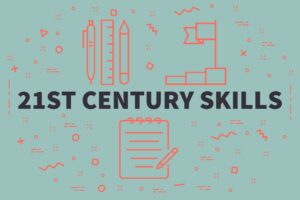Creating lessons that resonate with students can be a challenge. You’re not just imparting knowledge; you’re inspiring curiosity, fostering critical thinking, and making learning relevant. Experienced curriculum design is key to turning lessons into engaging and impactful learning experiences. Here we’ll discuss what experienced curriculum design is all about, why it’s a game-changer, and how you can begin incorporating it into your teaching practice as an educator today.
What is Experienced Curriculum Design?
Experienced curriculum design involves using your years of classroom experience to craft relevant, engaging lessons that resonate with students. It’s about leveraging your expertise and intuition to create inclusive, adaptable, and tailored lessons to meet every student’s diverse needs. This approach ensures that each lesson not only aligns with educational standards but also inspires curiosity, fosters critical thinking, and makes learning a dynamic and enjoyable process for everyone involved.
Benefits of Experienced Curriculum Design
Here are a few reasons why you should invest your time and energy into curriculum design.
Increased Student Participation
When you take the time to plan lessons thoughtfully, students are more likely to find the material interesting. This leads to a higher level of student engagement and participation, which is essential for learning.
Enhanced Learning Outcomes
By designing your curriculum based on the needs, abilities, and interests of your students, you are creating a more effective learning experience. This personalized approach helps students understand and retain the information better leading to an improved academic performance.
Teacher Well-being
Experienced curriculum design enables you to create lessons you enjoy teaching, boosting your satisfaction and enthusiasm while also allowing you to witness your students thrive. This approach fosters a positive and productive atmosphere, benefiting both you and your students.
Adaptive Instruction Methods
A well-designed curriculum allows you to adapt your lessons to meet the needs of each individual student. By accommodating individual learning abilities and styles, you are creating a more inclusive and effective learning environment for students, ensuring that each student will succeed.
Lifelong Learning
By creating engaging and relevant lessons, you can inspire a lifelong passion for learning, equipping students with the curiosity and motivation to continue exploring and growing throughout their lives.
Experienced Curriculum Design Tips
Now that you understand the importance of experiential curriculum design, let’s discuss some tips to help you get started.
Get to Know Your Students
The first step is to get to know your students better. Take the time to learn about their backgrounds, interests, and learning styles. You can have students take part in a survey, play a getting to know you game, or just talk one-on-one with each student. Use the information you learn to create engaging and meaningful lessons that inspire.
Establish Clear Objectives
Before you create a lesson, set a clear objective for what you want students to get out of it. This objective will help guide your planning and ensure a clear focus.
Incorporate Multiple Teaching Techniques
Each student learns in their own unique way, that’s why it’s important to use a variety of teaching methods. Choice boards are a great strategy to use to ensure students are learning in a way that suits their own learning style.
Apply Real-World Examples
Make your lessons relevant by using real-world situations and examples. This makes the material more interesting and helps students understand the practical applications of what they’re learning. Connecting classroom concepts to everyday life makes the learning experience more meaningful and impactful for your students.
Encourage Critical Thinking
Design activities that challenge students to think critically and solve problems. These activities help students develop essential skills such as analysis, evaluation, and problem-solving, which are valuable both inside and outside the classroom.
Gather Feedback from Students
Ask students for their feedback. Their insights can help you identify what’s working in the lesson and what needs improvement. Use this feedback to refine and improve your curriculum.
Collaborate with Fellow Colleagues
Share ideas and materials with your colleagues. Collaborating with your fellow teachers can spark new ideas, address challenges, and develop more effective teaching strategies that benefit all students.
Reflect and Revise
Take the time to reflect on your curriculum design regularly. Identify areas where you can improve and be willing to make changes. Continuous improvement is key to successful curriculum design, ensuring that your lessons remain relevant, effective, and responsive to your students’ evolving needs.
Stay Informed with Current Trends
Keep up with the latest trends in education. This can provide you with new insights and ideas for your curriculum. Staying current with educational advancements helps you bring fresh perspectives and innovative practices into your classroom.
Balance Structure and Flexibility
While it’s important to have a structured plan, being flexible enough to adjust your lessons is equally important. Sometimes, the best learning opportunities come from spontaneous moments in the classroom. Balancing structure with adaptability allows you to respond to your student’s needs and interests, creating a more dynamic and effective learning environment.
Experienced curriculum design is a powerful tool that can transform your teaching as well as your students’ learning experiences. By using your expertise and intuition, you can create lessons that are engaging, relevant, and effective. Remember, it’s not just about delivering content, it’s about creating meaningful learning experiences that will inspire and motivate your students.
Educators never stop learning; check out our available graduate degree programs to hone your skills and promote lifelong learning and academic excellence.




